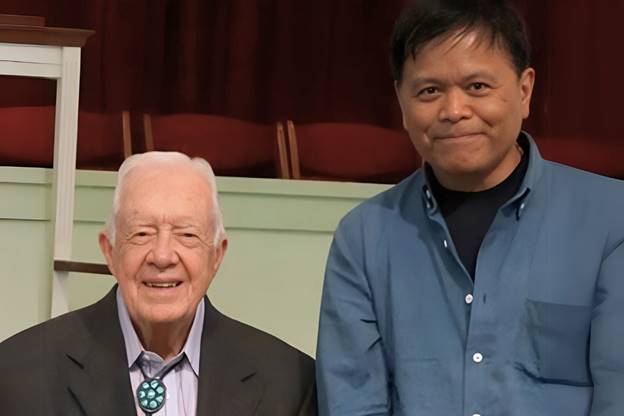
Noted journalist and commentator Emil Guillermo reflects on what he learned from the late President Jimmy Carter during a Sunday school lesson in Plains, Georgia. Carter, who won the Nobel Peace Prize in 2002, died Dec 29 at age 100 - Via AsAmNews
A Sunday School Lesson from Jimmy Carter
By Emil Guillermo
I’ve always been a big Carter fan, so when the news came of his passing, it brought me back to a happy place.
Plains, Georgia Sept. 11, 2016
I was visiting family not far from the land of presidential peanut farmers. I found myself the only full-blooded Filipino in the room at Maranatha Baptist Church, the spiritual home base for the esteemed No 39.
President Carter looked fine that Sunday in Plains. But especially fine for his job on that day – to give the Sunday school lesson on what coincidentally was the 15th anniversary of 9/11.
Carter’s health made headlines in 2015 when he disclosed having both brain and liver cancer. It was thought he had just two or three weeks to live.
Everyone was always underestimating Carter. After treatment, Carter’s forecast turned out not to be true.
When I saw him, Carter was spry, quick-witted, and kind – though he did tell a joke about an Asian American.
At the time, Carter said he’d just returned from San Francisco where he had “supper” with wealthy tech giants, including the widow of Steve Jobs, Laurene Jobs, as well as the first Asian American power couple of the world, Facebook’s Mark Zuckerberg and Priscilla Chan.
“She’s Chinese,” Carter said to his 99 percent White audience.
He then said the Facebook couple planned to give away 99 percent of their $50 billion fortune to charity.
“Only gives them $500 million for personal expenses,” Carter joked, drawing a big laugh from the crowd.
I’m guessing he wouldn’t have been so pleased at the tech community’s capitulation. Zuckerberg and other tech giants from Google, Amazon, and Open AI each gave a million dollars to support January’s inaugural.
But all that old tech gossip was just the warm-up for Carter’s Sunday school talk, something Carter started that year and continued doing for a few months.
Sunday Lesson
The former president wore a bolo string tie anchored by an eight-stone turquoise clasp that dangled below the neck, as he began the lesson on the subject of grief and the death of his 28-year-old grandson. Drawing from scripture (on this particular day, a passage on the persecution of the Thessalonians), Carter said such moments were simply tests of one’s faith, endurance, and hope.
He said overcoming all that was a matter of self-confidence and relying on our God-given talents, but it was difficult in all phases of life.
“We lack inspiration; we lack the idealism to set our goals high. We’ve been satisfied with mediocrity. And I include myself,” Carter said. People want an average life instead of aspiring to be “outstanding, or superb or brilliant or exceptional. And that is a problem we have,” said Carter. “We set our goals too low, we’re complacent, we’re satisfied with where we are.”
9/11
He then applied the lesson to the historic day of 9/11. He said we’re diminished as a country, and our goals for our nation’s future are set too low, he said.
“I’m afraid that our country and its effect on people of other nations has suffered from the aftermath of 9/11,” Carter said. He “didn’t want to brag,” but said his goal for the country was always to be “superb and be a country that promoted peace and human rights…While I was in office, we never dropped a bomb, lost a missile, or fired a bullet.”
Too much has changed, he said.
“Since 9/11,” Carter said, “we’ve pretty much abandoned our commitment to human rights as we reacted to terrorism.” He lamented that Afghanistan had become the longest war in American history, a direct outcome of 9/11, as well as the invasion of Iraq, which Carter called “unnecessary.”
A Divided Nation
Carter, whose administration took us out of an energy crisis, also pointed out how the US is still suffering from a financial crisis that has exposed a deep inequality that has divided us as a people.
“We’ve become distrustful of people who are different from us,” Carter said. “We used to be a proud heterogeneous nation…and now we are fearful…and we’ve become poorer as a country.”
Bi-partisan Support
Jimmy Carter’s sense of America and the world requires open minds to come together. Too often these days, that seems near impossible.
“When I was president, I got as much support from Republicans in the Senate and House as I did the Democrats,” Carter said. “Now if you’re a Republican, you don’t speak to Democrats, or support a Democratic president, or vice versa.”
His thoughts in 2016 have only grown exponentially.
“We’ve had a deterioration in the quality of life and the relationship between different people that now has become almost acceptable,” said Carter, who added the nation had changed so much it would be near impossible for the current Republican and Democratic candidates to declare their top priority to live in peace or to promote human rights.
“That was my inaugural speech; I only spoke 15 minutes,” said Carter, who noted that this vision wasn’t just his but shared by the American people who had “idealism and high standards and moral values…and now we’ve lost that.”
Now with Carter’s death, we all mourn.
(Emil Guillermo is a journalist and commentator. He was the first Filipino American to host a national news show in 1989 at NPR’s “All Things Considered.” See his “Emil Amok’s Takeout/What Does An Asian American Think?” on www.patreon.com/emilamok Subscribe to him on YouTube.com/@emilamok1 ) - EMS

